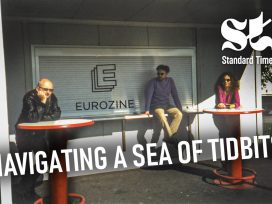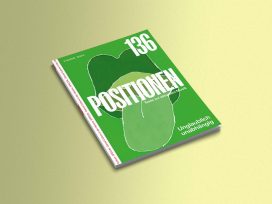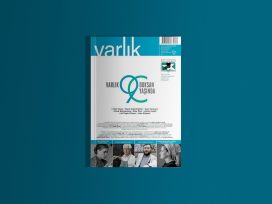Ninety-five per cent of the financing for Blätter für deutsche und Internationale Politik is through sales, with advertising revenue making up the rest. The journal receives no public funding – which makes it fairly exceptional among media of our type and is a pleasant situation to be in. Having said that, it does mean that we’re constantly looking for new products and ideas in order to continue to be able to self-finance.
Financing European cultural journals
Like other types of cultural organization reliant on public funds, cultural journals throughout Europe have felt the impact of recession. In addition to funding cuts, journals are also having to negotiate the upheavals taking place in the print sector.
Through a European survey of financing for cultural journals, Eurozine takes stock of the situation of the network, in order to communicate its experiences internally and to others who hold a stake in European cultural policy today. [more]
Read the statements here:
Varlik, Turkey
Ord&Bild and Glänta, Sweden
Vikerkaar, Estonia
Wespennest, Austria
Sodobnost, Slovenia
Host, Czech Republic
Res Publica Nowa, Poland
Mute, UK
Intellectum, Greece
Blätter für deutsche und internationale Politik, Germany
Blätter‘s financial situation has not changed dramatically of late. Until now, at least, we haven’t felt the direct impact of the recession in Europe. Subscriptions have been steadily increasing for the last seven years or so. We currently have around 7000 subscribers; in the last few years this number has been increasing by an average of 300 a year.
We have two types of subscription: a standard one and a reduced subscription for students and the unemployed. Public and university libraries can also order Blätter for a reduced price – though savings measures means library orders are declining. So far we have not been forced to launch a donation campaign or a campaign for so-called “solidarity subscriptions”.
Blätter is an independent publisher; in other words, the staff are the owners of the limited company at and the editors of the journal. We receive the normal tax rebates for companies while VAT on our products ranges from 7 to 19 per cent. We also receive postal rebates when we send journals in bulk, which saves distribution costs. This is an offer that applies to all publishers and media companies in Germany.
Overtime is the norm, although less so than a few years ago. On the other hand, we do benefit from our “self-exploitation” – we’ve been able to turn our hobby into a largely profitable and independent occupation. The core staff is supported by two interns (whose expenses we pay) and a part-time employee who deals with orders and customer enquiries.
I would say that the real problems for journals in Germany are not recession related, unless we’re talking about the slump in the ad market. For quite some time now, journals have found themselves facing two major challenges: on the one hand, the sharp decline in interest in specialist publications – particularly in the area of politics. Readers of traditional journals are quite literally dying out. Publishers are therefore having to attract new and younger readers. It’s not just a question of marketing, it’s also an editorial challenge. The quality of the content is crucial – it’s about publishing texts that can’t be found anywhere else. The other challenge is the “digital revolution”. Journals are having to react very quickly to new media and this can be costly and resource consuming. In both cases, I think, the Internet is competitor and opportunity.
What will developments in the next few years look like? When it comes to political topics, what’s available in traditional publications in is diminishing rapidly. This doesn’t just go for the daily and weekly press but periodicals as a whole. Many magazines can only survive with financial support – although they too are finding themselves confronted with decreasing readerships and need to react. My guess is that, in the future, products will become increasingly digitalized and that the market will shrink. The latter in particular is regrettable in terms of journalism and the public sphere.
Around a year-and-a-half ago we modernized Blätter‘s website completely. We now use the site above all as an advertising platform for the journal. That means that the majority of the content is provided for a fee: prices for articles range between one and three euros (micropayment). Print subscriptions automatically include online subscriptions. We also publish free content that we change constantly. This keeps the site fresh and allows us to react to daily journalistic developments. More and more, we find that our readers want to be able to buy the journal in digital format. We’re planning very soon to introduce digital products, including formats for tablets and e-books. This does not signal a wholesale shift from print to digital, however: the print journal remains the relevant format for Blätter.
As to whether we are noticing a decline in demand for the long-form text: no, quite the opposite. If anything, the demand for in-depth background information is increasing – not least because it is no longer met by the mainstream print media. Evidence of this are the various collaborations we have going with publishers, the larger blogs and other print media – not only advertising but also the translation and re-publication of texts.
As already mentioned, our self-financing model requires that we are constantly exploring new products and ideas. For several years now we’ve published books and we have made our archive from 1956 onwards available on DVD. In 2013 we are planning a series of large scale events in cooperation with a partner in Berlin and hope to be able to do this regularly in the future.
What role does partnership in a network like Eurozine play in economic and journalistic terms? In strictly economic terms, cooperation with Eurozine has not “paid off”: few subscriptions come through membership in the Eurozine network. However Eurozine helps Blätter to become better known internationally, above all in the English-speaking countries. We also use the network to keep informed about the contents of other partner journals. Eurozine’s aim to create a multilingual European public sphere is exciting and important. Perhaps it will create an awareness of the social necessity of publications such as ours. In any event, we could and should make more use of the exchange between the different European magazines – particularly in times of crisis, where Germans particularly tend to discuss Europe only among themselves.






